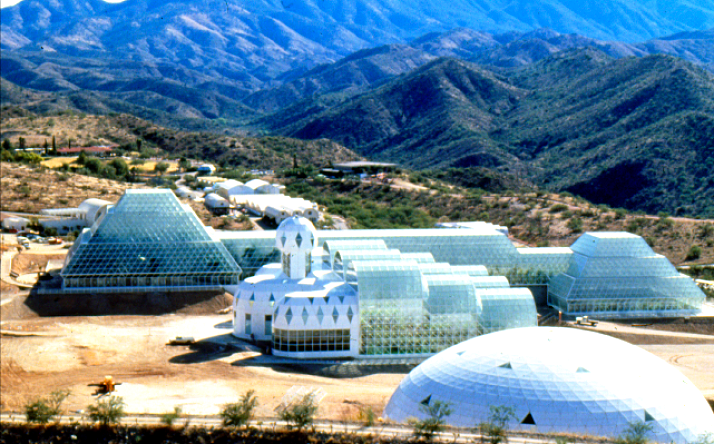Anthony Blake:
Our series of ‘Invitation to Conversation’ continues on the 18th with a session on the Biosphere, its intelligence and our place in it. The conversation will be spearheaded by Mark Nelson, one of the eight ‘biospherians’ who lived for two years inside Biosphere 2. The facility was a mini-biospheric closed ecological system to study basic biosphere processes and the integration of humans, farming and technology. It was called Biosphere 2 to emphasize the importance of Earth’s Biosphere (Biosphere 1). Mark has already contributed to the DuVersity programme a few years ago in the seminar held in Nashville, Tennessee, called Brave New World.
The idea of the Biosphere was largely developed by the Russian scientist Vladimir Vernadsky in the first half of the twentieth century and only became generally known in the West starting in the 70s, though understanding how profoundly the biosphere has shaped the Earth we live on and that it is literally our life support system are far less widely understood. The visionaries, led by polymath John Allen – engineer, poet, dramatist, explorer – who came to build Biosphere 2 were inspired by Vernadsky but also studied the ideas and methods of John Bennett. Bennett had read Vernadsky - in French – in the 1930s and made use of his ideas in writing The Dramatic Universe (see attached extract on the Hypothesis of Biospheric Wholeness).
Our second speaker in the conversation will be Peter Basset, a consultant who has been advising many companies on the intelligent use of energy. He will bring his long experience of talking with commercial leaders and monitoring changes in thinking. I will be taking the third role. I have known John Allen since 1970 and came to edit the first book published on the project called Biosphere 2 – The Human
Experiment.
The people behind the project had a ‘total systems’ perspective that led them to embrace a threefold vision of the synergy of Biosphere, Technosphere and Ethnosphere (the realm of human cultures). They aligned themselves with the Vernadsky vision of the Biosphere evolving a noosphere, a realm of intelligence which is needed if humanity is to become conscious and creative participants in Earth’s evolution (you can read of Bennett’s take on this in the extract from the Dramatic Universe appended).
In our session we hope to bring together numerous strands of enquiry into the nature and purpose of the Biosphere and our place in it. But a crucial factor is to find a way of sensing and feeling the fact that we are a part of the Biosphere and not its master. We invoke the Gurdjieffian idea that understanding requires a harmony of thinking, feeling and sensing. And we hope that the conversation will evoke new patterns of thinking beyond naïve ideas of what is ’good’ or ‘bad’.
Preparatory Task
We invite you to experiment, as best you can under present circumstances, to find a way of having a real concrete connection with the Biosphere. Maybe you undertake to actually ‘talk with trees’, or you spend time working with the soil to become more aware of its extraordinary and precious life. You can extend your attention to the air and to the waters of streams and seas for these are permeated with Biospheric genius. You might even reflect on the covid virus! But please do not just ‘think about’ these things. Enter into their living presence. Get yourself to experience what food really is.
Format
The session will have a 15 minute introduction setting out the programme and the theme of the conversation. It will include what we call an ‘inner exercise’ based on Bennett’s methods that brings attention into the air we breathe. After that there will be roughly an hour when we develop the ‘trialogue’ or threefold conversation. Meanwhile, participants are free to post their questions and comments. Some of these will be taken up and brought into the conversation and we will then open up the session to be a ‘public forum’. About 10-15 minutes before the ending of the session there will be a overview and a final item.
References
Mark Nelson, Pushing Our Limits: Insights from Biosphere 2, University of Arizona Press, 2019
Matt Wolf (dir.) Spaceship Earth, 2020 https://www.imdb.com/title/tt11394188/
